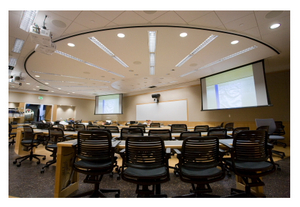
In August, the Koret Foundation completed their generous $1.5-million gift to Boalt Hall to create the Koret Interactive Learning Center.
Officially completed this summer, the 60-person, multi-purpose room, located in the heart of the law school, is a state-of-the-art learning environment that has been used as a classroom with audio-visual capabilities since august 2008 and as a video-conferencing facility since spring 2009.
Richard Greene ’63, a member of the Foundation’s board of directors, notes that Koret rarely makes grants of this size to a single organization. A former adjunct professor at the law school, Richard says the Koret Foundation views Boalt as one of the premier learning institutions in the country. “We look to support entities that generate important projects and address real problems in society,” he says. “This grant clearly fits that description.”
Carefully planned for flexibility and scalability, the classroom shines both as a comprehensive high-tech local classroom as well as a premier distance learning resource. Its flexible design and rich array of features allow for dozens of presentation scenarios for local or remote classrooms, seminars, and panels. (View the list of features here. pdf)
Global Reaching and Teaching
The law school’s faculty members have used the videoconferencing technology to host guest speakers from around the world and to co-teach with faculty at Columbia Law School. Additionally, the law school recently held a videoconference between its Berkeley and Washington, D.C. campuses during which students had the opportunity to engage with John Podesta, former chief of staff under President Clinton.
The room’s capabilities also enabled Professor Alice Miller to partner with Mary Robinson, former President of the Republic of Ireland and United Nations High Commissioner for Human Rights, to offer a seminar on Human Rights and Ethical Globalization. The course was offered jointly to students at Boalt, where Professor Miller is in residence, and Columbia University, where Professor Robinson is in residence. The instructors used the technology to host sessions in which the Berkeley and Columbia students could all participate in discussions with both professors. This technology made it possible for the Berkeley students to engage in meaningful interaction with Professor Robinson, one of the towering figures in human rights law world-wide.
As Dean Edley notes, this is just the beginning. “It’s simply an amazing resource,” says Edley. “We’re all dazzled by its capabilities, and we’re only just beginning to tap into its potential. I’m deeply grateful to the Koret Foundation for making it possible.”